Salò, or the 120 Days of Sodom Blu-ray Movie
HomeSalò, or the 120 Days of Sodom Blu-ray Movie 
Salò o le 120 giornate di SodomaCriterion | 1975 | 117 min | Not rated | Oct 04, 2011
Movie rating
6.7 | / 10 |
Blu-ray rating
| Users | 4.7 | |
| Reviewer | 5.0 | |
| Overall | 4.7 |
Overview
Salò, or the 120 Days of Sodom (1975)
In World War II Italy, four fascist libertines round up nine adolescent boys and girls and subject them to 120 days of physical, mental, and sexual torture.
Starring: Paolo Bonacelli, Giorgio Cataldi, Hélène Surgère, Caterina Boratto, Aldo VallettiDirector: Pier Paolo Pasolini
| Foreign | Uncertain |
| Drama | Uncertain |
| Erotic | Uncertain |
| War | Uncertain |
| Thriller | Uncertain |
Specifications
Video
Video codec: MPEG-4 AVC
Video resolution: 1080p
Aspect ratio: 1.85:1
Original aspect ratio: 1.85:1
Audio
Italian: LPCM Mono
English: Dolby Digital Mono
Subtitles
English
Discs
50GB Blu-ray Disc
Single disc (1 BD)
Playback
Region A (locked)
Review
Rating summary
| Movie | 5.0 | |
| Video | 4.5 | |
| Audio | 5.0 | |
| Extras | 4.5 | |
| Overall | 5.0 |
Salò, or the 120 Days of Sodom Blu-ray Movie Review
Reviewed by Dr. Svet Atanasov September 28, 2011Piere Paolo Pasolini's "Salò o le 120 giornate di Sodoma" a.k.a "Salò, or the 120 Days of Sodom" (1975) arrives on Blu-ray courtesy of Criterion. The supplemental features on the disc include English-language trailer; "Salo": Yesterday and Today, a documentary film produced for Carlotta Films; Fade to Black, a documentary feature; video interviews with set designer Dante Ferretti and filmmaker and scholar Jean-Pierre Gorin; and more. The disc also arrives with an illustrated booklet featuring essays by Neil Bartlett, Catherine Breillat, Naomi Greene, Sam Rohdie, Roberto Chiesi, and Gary Indiana, as well as excerpts from Gideon Bachmann's on-set diary. In Italian, with optional English subtitles. Region-A "locked". Please be advised that the film contains disturbing and graphic footage that is not appropriate for minors!
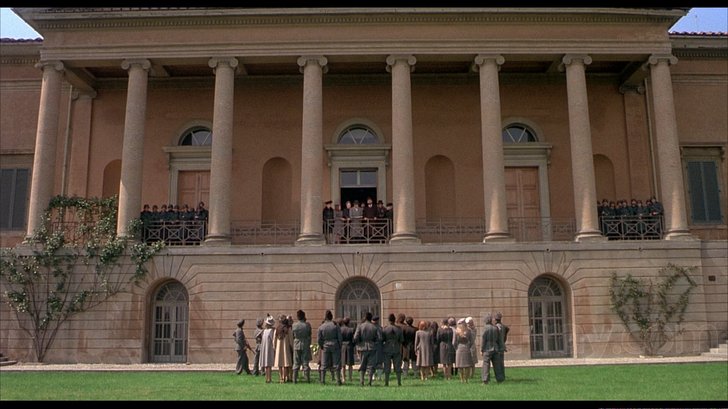
The beginning
Fascist Italy, 1944. Somewhere on the outskirts of Salo. Sixteen beautiful boys and girls are captured and locked into a secluded villa guarded by armed soldiers. Four dignitaries, assisted by four middle-aged women, will unleash a horrific sadistic ball during which their captives will be sexually humiliated and then tortured.
In the Circle of Manias, the dignitaries will be aroused by erotic stories before they indulge into perverted sexual acts.
In the Circle of Shit, the dignitaries will succumb to their most despicable fantasies. They will eat and then feed to others their own excrement.
In the Circle of Blood, the dignitaries will punish their victims according to a set of rules they have accepted.
Based on Marquis de Sade’s 120 journées de Sodome, Pasolini’s Salo is a film impossible to critique. Its narrative and graphic imagery defy everything human beings have come to accept as human. Its core is built on evil, despondency and humiliation impossible to rationalize, let alone critique. Yet behind the graphic tortures and sadistic acts Salo reveals, some believe lies a message in support of humanity; a weak, hurt and dying hope that if faced without fear evil could be defeated.
If approached as the final work of a director disgusted with man's progress and a desperate exploration of the destructive culture of superiority and man’s thirst for power, spiritual and physical, Salo does indeed succeed in forcing the viewer to seriously ponder the origin and nature of evil. But it does so in such an uncompromising fashion that the viewer eventually feels that he has been assaulted as much as the poor boys and girls the fascists bring to the villa.
Many have claimed that Salo is a symbolic film reuniting politics with sensationalism eased by images of human degradation unseen in other films with similar agendas, but I disagree. No one, not even Pasolini, could have afforded to go this far to simply propagandize a political ideology (Salo isn’t entirely truthful to Sade’s 120 journées de Sodome either) that would contradict the very message his film delivers. No, Salo is a personal film free of political allegories and cheap sensationalism. Salo is an unconditional rejection of power and those who pursue it, regardless of who or what they are, or what they represent.
Unsurprisingly, throughout Salo the fascists become intoxicated with power while citing the words of Nietzsche, Klossowski, and Sade (not coincidentally all writers and philosophers who have decried the existence of God). Power, as embraced and abused by the fascists, Pasolini argues proves human kind's inability to confront its own weaknesses. And indeed, the victims' behavior as well as their acceptance of the unspeakable perversions initiated by the fascists proves that defeat is inexorably linked to power - hence the reason why both Sade’s 120 journées de Sodome and Salo culminate in horrific scenes depicting grotesque violence and self-destruction.
Even though Pasolini’s film takes us back to the last days of Fascist Italy, its message isn’t dated. On the contrary, it is as urgent as it has ever been. After Darfur, Rwanda, and Bosnia it is that much clearer that evil is part of human nature. It is in us, waiting to be given a chance to corrupt our souls.
Note: Pasolini did not live to see Salo released theatrically. He was killed on November 2, 1975, in Ostia, near Rome, supposedly by a male hustler. In recent years, however, it has been speculated that his death was ordered by powerful men who disliked his leftist views.
Salò, or the 120 Days of Sodom Blu-ray Movie, Video Quality 
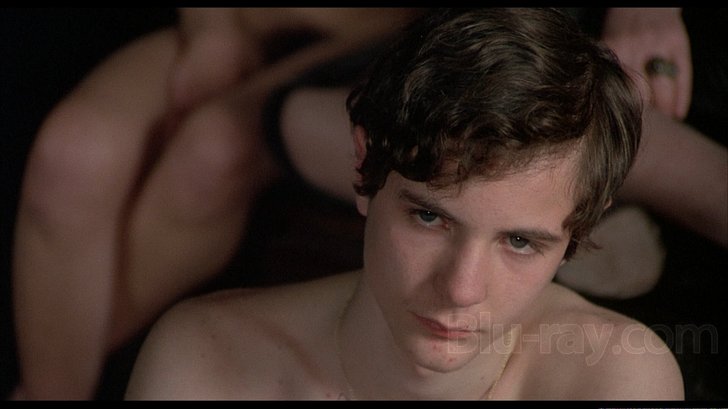
Presented in its original aspect ratio of 1.85:1, encoded with MPEG-4 AVC and granted a 1080p transfer, Pier Paolo Pasolini's Salo arrives on Blu-ray courtesy of Criterion.
The following text appears inside the booklet provided with this Blu-ray disc:
"This high-definition digital transfer was created on a Spirit 2K Datacine from a 35mm interpositive. Thousands of instances of dirt, debris, scratches, splices, warps, jitter, and flicker were manually removed using MTI's DRS system and Pixel Farm's PFClean system, while Digital Vision's DVNR system was used for small dirt, grain, and noise reduction.
Telecine supervisor: Maria Palazzola.
Telecine colorist: Gregg Garvin/Modern Videofilm, Los Angeles."
Criterion's presentation of this most controversial film is without a doubt a lot more pleasing than BFI's. However, I believe that it is important to point out that BFI's Blu-ray release arrived in 2008, it was their first, and at the time represented a substantial improvement in terms of quality over the R1 SDVD release Criterion had produced. I remain convinced that in 2008 it was well worth obtaining it.
The most notable improvement here is the almost complete elimination of the light machine noise that is present on the BFI release. In 2008, I was not particularly bothered by it as it was rather easy to tolerate in motion, but as encodes matured and the studios greatly improved their compression efforts, it is obvious that quality standards also evolved, including mine.
It is also more than obvious now that the existing Italian master which the BFI and, I assume, Criterion have worked with has various limitations that can be weakened but not convincingly addressed. In other words, I believe that it isn't right to judge how Salo looks in absolutely terms. This is strictly my opinion but for the time being I am convinced it makes the most sense, particularly because we have economic conditions under which best presentation and best possible presentation I must speculate mean the same to virtually all distributors releasing films on Blu-ray.
Detail and especially clarity are obviously better on Criterion's release. Contrast levels are also a lot more pleasing, particularly during the darker sequences from the final third of the film. Brightness has been effectively toned down and then plenty of the machine noise mentioned earlier carefully removed. But it isn't completely eliminated, and during selected close-ups (see screencapture #2) it is easy to see small traces of it. All things considered, however, I believe that this is the best Criterion could do to weaken it.
Some traces of mild sharpening remain (see screencapture #8). The majority of them, however, are easy to tolerate when the film is viewed in motion. Additionally, grain is present, but it is not always well resolved and occasionally it is mixed with various doses of light noise.
Criterion's release also has a different color-scheme, which follows a trend to favor stronger and warmer reds over colder greens and blues (see also Criterion's releases of Jean-Pierre Melville's Le Cercle Rouge and Michelangelo Antonioni's Red Desert). I am not particularly bothered by it as it is well balanced, but I expect different viewers to have different reactions to it. Finally, aside from a few minor flecks popping up here and there, there are no large cuts, warps, and damage marks. There are no serious stability issues to report in this review either. (Note: This is a Region-A "locked" Blu-ray disc. Therefore, you must have a native Region-A or Region-Free PS3 or SA in order to access its content).
Salò, or the 120 Days of Sodom Blu-ray Movie, Audio Quality 
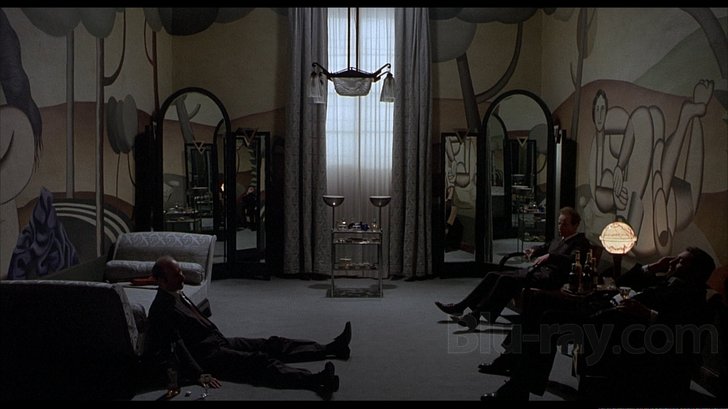
There are two audio tracks on this Blu-ray disc: Italian LPCM 1.0 and English Dolby Digital 1.0. For the record, Criterion have provided optional English subtitles for the main feature.
The Italian LPCM 1.0 is excellent. When compared to the lossy track from the SDVD release, the sound clearly has more depth and fluidity. This is fairly obvious when during the various solos (strings and woodwinds). There are no balance issues with Ennio Morricone's soundtrack. I also did not detect any problematic distortions in the high-frequencies to report in this review. The English translation is very good. However, it is not identical to the English translation from the BFI release.
Salò, or the 120 Days of Sodom Blu-ray Movie, Special Features and Extras 
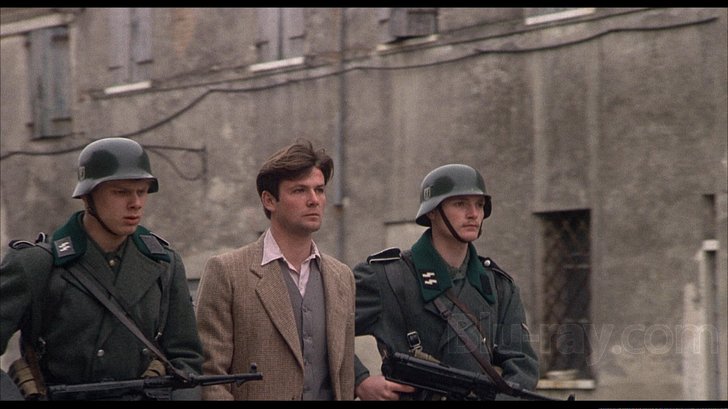
- "Salo": Yesterday and Today - in this documentary film, produced for Carlotta Films in France, director Pier Paolo Pasolini discusses his controversial film, what inspired him to shoot it, the symbolism in it and specifically its similarities with Dante's Inferno, etc. The film also features interviews with filmmaker and longtime Pasolini collaborator Jean-Claude Biette, and actors Helene Surgere and Ninetto Davoli. Archival footage from the shooting of the film in Cinecittà is also included. In Italian and French, with optional English subtitles. (34 min, 1080i).
- Fade to Black - a very informative documentary about Salo and the life and tragic death of its director. The documentary features interviews with Pasolini, directors Bernardo Bertolucci and Catherine Breillat, John Maubury, and scholar David Forgacs. In English and Italian, with imposed English subtitles where necessary. (24 min, 1080i).
- The End of "Salo" - in this featurette, actors Antinisca Nemour and Paolo Bonacelli, screenwriter Pupi Avati, production designer Dante Ferretti, assistant director Fiorella Infascelli, assistant editor Ugo Maria De Rossi, and others discuss the film's production history and Pasolini's legacy and tragic death. In Italian, with optional English subtitles. (40 min, 1080i).
- Dante Ferretti - production designer Dante Ferretti discusses his worn on Salo and professional relationship with Pasolini. In Italian, with optional English subtitles. (12 min, 1080i).
- Jean-Pierre Gorin - in this video interview, filmmaker and scholar Jean-Pierre Gorin discusses Salo and Pasolini's legacy. The interview was recorded exclusively for Criterion in New York City in February 2006. In English, not subtitled. (28 min, 1080i).
- Trailer - an English-language trailer for Salo. Not subtitled. (4 min, 1080i).
- Booklet - an illustrated booklet featuring essays by Neil Bartlett, Catherine Breillat, Naomi Greene, Sam Rohdie, Roberto Chiesi, and Gary Indiana, as well as excerpts from Gideon Bachmann's on-set diary.
Salò, or the 120 Days of Sodom Blu-ray Movie, Overall Score and Recommendation 
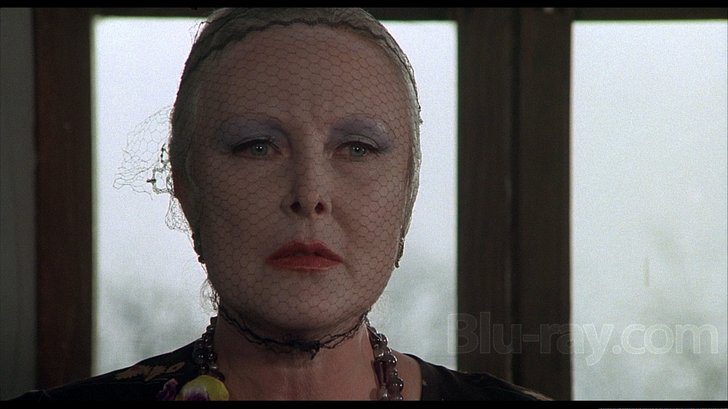
Despite claims to the contrary, Pasolini's Salo is not a pornographic film. It is about man's obsession with power, the kind that incorrigibly corrupts the soul, and pure evil, which destroys it. It is a difficult film to endure, but necessary to see. Criterion's presentation of Salo is clearly stronger and more satisfying than BFI's, which is the only other English-friendly presentation of the film. HIGHLY RECOMMENDED only for mature viewers.
Similar titles
Similar titles you might also like

Rome, Open City
Roma città aperta
1945

Satantango
Sátántangó
1994

State of Siege
État de siège
1972

The Club
El Club
2015

Red Desert
Il deserto rosso
1964

The Ascent
Восхождение / Voskhozhdenie
1977

Germany Year Zero
Germania anno zero
1948

Paisan
Paisà / Original Release Version
1946

Identification of a Woman
Identificazione di una donna
1982

Stalingrad
1993

Europa
Zentropa
1991

The Decameron
Il Decameron
1971

Come and See
Иди и смотри / Idi i smotri
1985

The Canterbury Tales
I racconti di Canterbury
1972

I Knew Her Well
Io la conoscevo bene
1965

Hands Over the City
Le mani sulla città
1963

Throne of Blood
蜘蛛巣城 / Kumonosu-jô
1957

The Passion of Anna
En passion
1969

Le Petit Soldat
The Little Soldier
1963

The Turin Horse
A Torinói ló
2011
